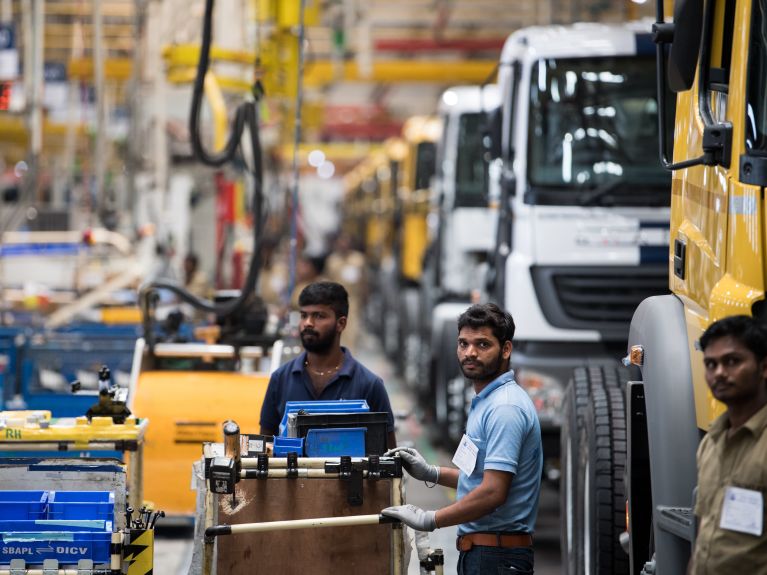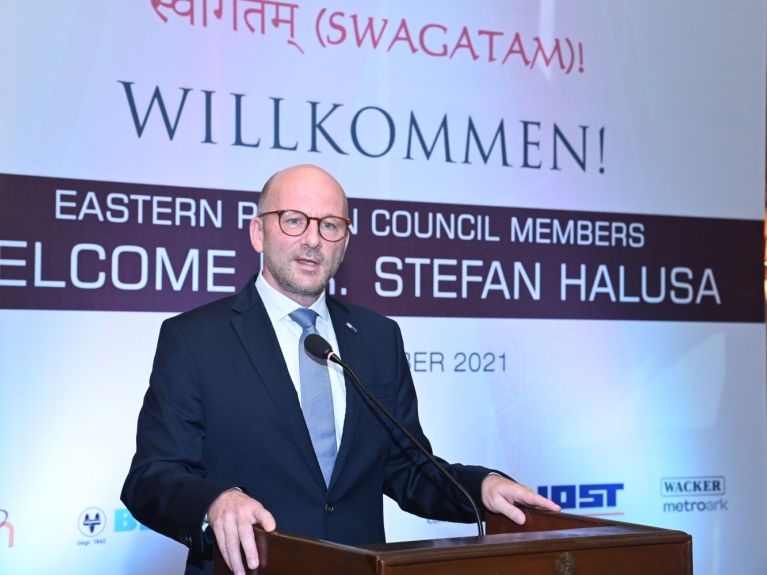New opportunities for Indo-German trade
Indo-German consultations: Stefan Halusa from the Indo-German Chamber of Commerce in India believes in impetus for partnerships.

Mr Halusa, Indo-German trade increased by nearly 20 percent in 2021 despite the pandemic. What is the reason for this robust growth?
The overall volume of India’s foreign trade increased significantly in 2021, with trade in goods even soaring by over 50 percent. Exports grew more quickly than imports, meaning that bilateral trade with Germany profited to only a below-average extent. The growth in imports from India somewhat exceeded the growth in exports to India. We still envisage great potential here and hope that the two countries will follow through on their decision in May 2021 to resume negotiations on a trade and investment agreement between India and the EU.

Which goods are traded primarily?
Germany supplies machines, chemical products, aircraft and electronics. Exports of road vehicles and vehicle components saw the most rapid growth in 2021. India’s leading exports to Germany are chemical products, including pharmaceuticals, as well as clothing and machines. Iron and steel exports increased the quickest.
In absolute terms, how high are imports and exports, and how high are direct investments?
According to Destatis and Germany Trade and Invest (GTAI), Germany exported goods and services worth US$14.7 billion to India in 2021. Imports from India totalled US$12.9 billion. This puts Germany in sixth place on the list of Indian trade partners. India ranks 23rd in terms of German sales markets, and 26th in terms of imports. As far as direct investment is concerned, Germany’s investments in India from 2000 to 2020 totalled around US$13.5 billion, putting it in seventh place. India ranks 29th with its direct investments in Germany.
India is one of Germany’s most important partners in the region.
In which areas do you envisage opportunities for trade between Germany and India?
The Indian government has announced numerous “production-linked incentives” that are designed to create jobs in industry in India. We see this as presenting good business opportunities for German companies. Other areas are infrastructure and renewable energies. This will lead to a shift in import volumes, which today are dominated by energy imports. Another change that could benefit German firms is the declared goal of the Indian government to reduce its business connections with China, which is currently India’s foremost trade partner.
How is business changing as a result of the pandemic, the German government’s new Indo-Pacific guidelines and the Russian attack on Ukraine?
The adoption of the Indo-Pacific guidelines by the German government was greatly welcomed in India. That said, they have had little in the way of any practical impact as yet. This is partly due to the pandemic, which has made many things more difficult. The Indo-German government consultations will take place in Berlin in early May. We expect these to give something of a push. India is one of Germany’s most important partners in the region, and we expect this partnership to become increasingly important. We need a strategic dialogue, especially in view of the Russian attack on Ukraine.
Let us turn briefly to you: you have run the largest German chamber of commerce abroad in Mumbai for a year. What are your personal impressions of India?
So far they have been influenced to some extent by the pandemic, though life has been returning to normal recently. Germany, German companies and German products have a very good reputation in India. The aid that arrived from Germany, especially during the second wave of Covid last year, met with a very positive response in India. During my conversations with people, I see great open-mindedness, and equally great self-confidence. This allows dialogues to take place on an equal footing, which forms a good basis for goal-oriented exchange.


